By: ʿĀlimah Siddiqa al-Fārsiyyah
Fatḥ al-Bārī bī Sharḥ Ṣaḥīḥ al-Bukhārī lit. ‘Victory of the Creator’ is a voluminous commentary composed by ‘Allāmah Ibn Ḥajar Al-‘Asqalānī [d.852A.H.] (Allah be pleased with him). Considered his magnum opus, Allāmah Ibn Ḥajar has also authored a prolegomenon for it, commonly known today with the title “Hadyu‘s-Sārī”. However, was it truly the author – ‘Allāmah Ibn Ḥajar himself – who has given this title to his prolegomenon? If yes, is this the correct dhabt (spelling) of the title or has he actually written it in a different way? This article aims to shed some light upon these questions, In Shā Allāh.
Hadyu‘s-Sārī is one of the most important books of Introduction, as it contains discussions related to Imām Bukhārī’s Al-Jāmi’us Ṣaḥīḥ. There is a difference of opinion among scholars and researchers regarding what ‘Allāmah Ibn Ḥajar named his introduction.
Some scholars are of the opinion that ‘Allāmah Ibn Ḥajar has not given a separate title to his introduction of Fatḥ al-Bārī, rather he simply called it “Al-Muqaddimah” or “Muqaddimatu Fathi ‘l-Bārī” lit. ‘The Introduction of Fatḥ al-Bārī’. Others are of the opinion that the author has given his introduction a separate title but they further divide into two groups in regards to how the title was spelled. The first group says it is called Hadyu‘s-Sārī, with a fatḥa on the hā’ and a sukūn on the dāl, and the second group says that it is called Huda‘s-Sārī, with a dhamma on the hā’ and a fatḥa on the dāl.
Those who say that ‘Allāmah Ibn Ḥajar has simply called his introduction Muqaddimatu Fathi ‘l-Bārī say so based on manuscripts like that of Shahīd ‘Alī #432 which was written in the year 846A.H. On the cover of this manuscript, we find that the title has been written as the following: مقدمة فتح الباري شرح البخاري. (see image below)
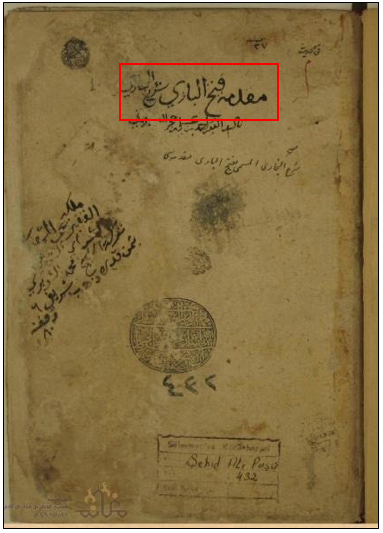
Similarly, in the manuscript of ‘Alī bin Muḥammad al-Bulqīnī [d.883A.H.] #3962 written in the year 835 A.H, preserved in Chester Beatty Library; and in the manuscript of Maktabah Taimūriyyah, they have a similar title. (see two images below)

However, this opinion does not seem correct, as many students of ‘Allāmah Ibn Ḥajar have said that he has named his muqaddimah. The above manuscripts can perhaps be explained by the likelihood that ‘Allāmah Ibn Ḥajar did not name his introduction in the beginning stage of his life, but did so at a later stage. Hāfidh Taqī ad-Dīn Muḥammad ibn Fahd – one of the students of ‘Allāmah Ibn Ḥajar – has said in his Lahdhu ‘l-Alhādh pg. 213:
ومقدمته في مجلد ضخم أو مجلدين تشتمل على جميع مقاصد الشرح سوى الأسئلة فإنها حدفت وسماها: هدى الساري لمقدمة فتح الباري. اهـ
Likewise, Imām As-Sakhāwī [d.902A.H.] has said in Al-Jawāhir Wa ‘d-Durar pg.676 Dār Ibn Ḥazm:
مقدمته المسماة هدى الساري في مجلد ضخم أو مجلدين كملت في سنة ثلاث عشرة وثمانمائة تشتمل على جميع مقاصد الشرح سوى الاستنباط. اهـ
Even when we look into one of the manuscripts of Al-Jawāhir Wa ‘d-Durar, that of Shaykh Muḥammad bin ‘Alī bin Ibrāhīm Al-Fayrūzbādī Al-Ḥanafī, written in the year 895A.H., we find that he has written the title as well. Evidently, he has not written the diacritics on the title, although he has written the yā with two dots under it, possibly indicating that he knew the title as Hadyu‘s-Sārī’. However, the dotted yā in itself cannot be of any evidence, since the writer seems to have a habit of writing and omitting the dots in random patterns; such as omitting it in the particle fī and writing it in the particle ‘alā. (see image below)
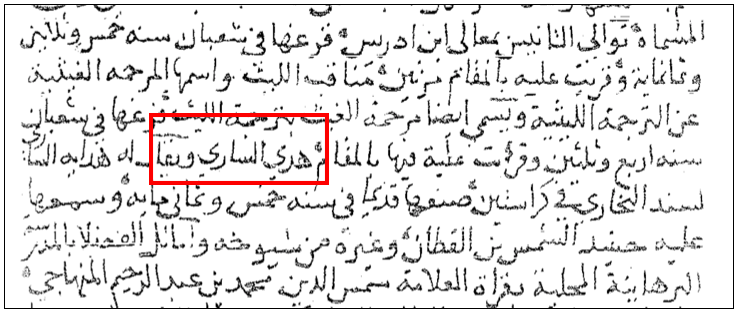
Another student, Imām As-Suyūṭī has said in his Nadhmu ‘l-‘Uqyān pg.46:
ومن تصانيفه فتح الْبَارِي شرح البُخَارِي، ومقدمته تسمى: هدى الساري. اهـ
This is also confirmed by the manuscript of Shaykh Muḥammad bin Muḥammad Muhibbu‘d-Dīn al-Mālikī wherein he has written the title as well. Like the previous writer, however, he has not placed diacritics and has written two dots under the yā in the word ‘hady’. As mentioned, this again cannot be evidence to suggest that the title is Hadyu‘s-Sārī, as the author seems to have a habit of writing and omitting the dots of the yā in random patterns. Furthermore, in another place in his manuscript, he has written the double dots under the yā in the phrase ‘huda Allah’ as well, indicating that even if he wrote a dotted yā for the title, he could have likewise meant to write the word ‘huda’ there too. (see images below)
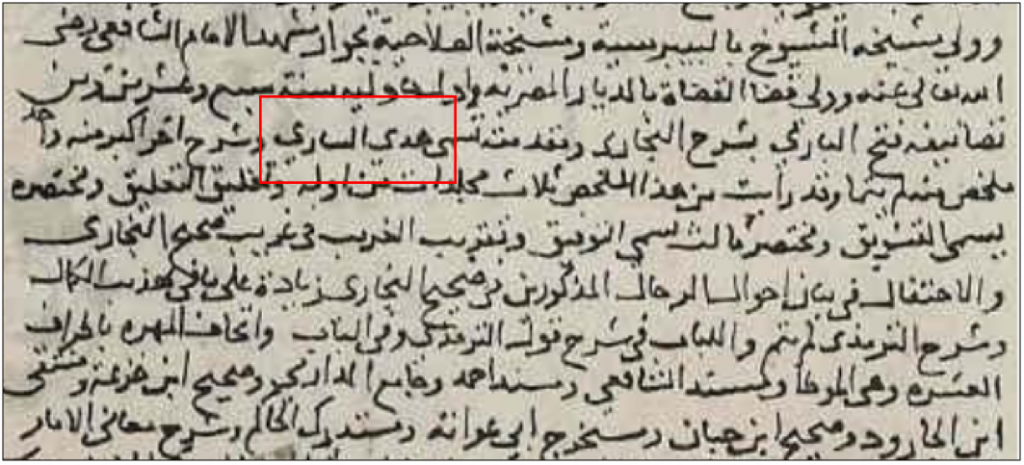
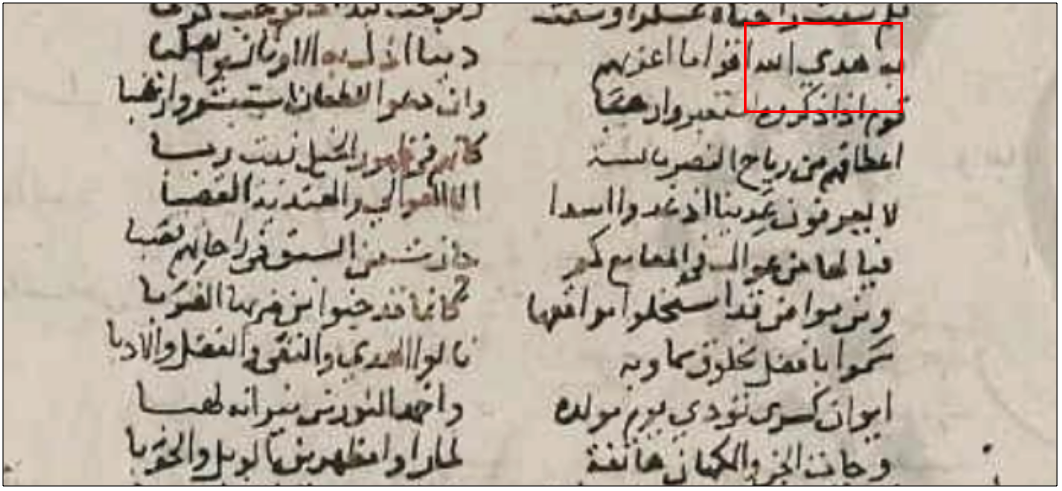
This habit of omitting and writing the double dots on the yā – which distinguishes it from an alif maqsūrah – could be one of the leading factors as to why Huda‘s-Sārī was sometimes confused and read as Hadyu‘s-Sārī, until it became like engraved in stone in our era today, with almost all publishers publishing the book with the title Hadyu‘s-Sārī. Of course, the question still remains, did the author write it as ‘hadyu’ or ‘huda’? For this, we look into the very last reliable manuscript that is available to us in which ‘Allāmah Ibn Ḥajar himself has written the title: the manuscript of Al-Maktabah Adh-Dhāhiriyyah written by Muḥammad bin Ṣadaqah Al-Māliki in the year 851A.H. This manuscript was in the possession of ‘Allāmah Al-Baqa’ī [d.885A.H.] and he read it upon ‘Allāmah Ibn Ḥajar in the year 852A.H. ‘Allāmah Ibn Ḥajar also confirmed the recital by writing at the end of the manuscript. On the cover of this manuscript, he has written the title as “Huda‘s-Sārī”. (see images below)
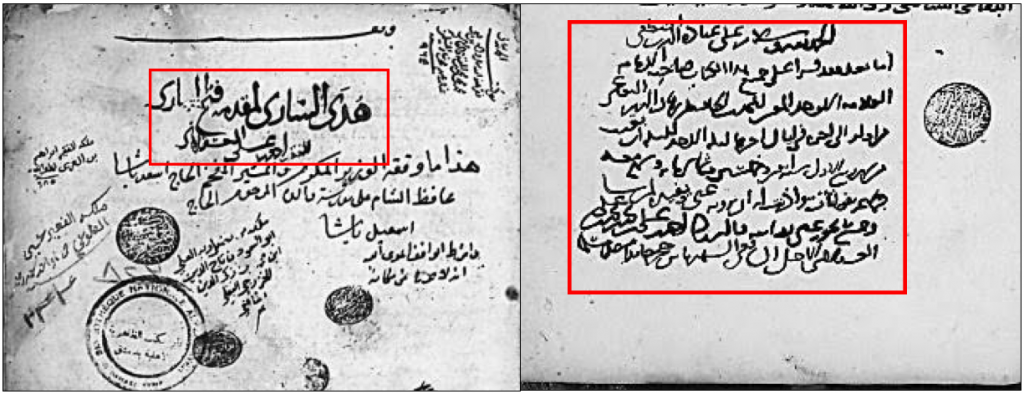
The reasons why this manuscript is so valuable are the following:
- This manuscript belongs to ‘Allāmah Burhānu ‘d-Dīn Al-Baqā’ī, who was one of the close students of ‘Allāmah Ibn Ḥajar. Surely, he is one of the most probable of people who would know whether or not the author named his introduction, and if yes, then what the title was.
- This is most likely the last manuscript of Huda‘s-Sārī that was recited upon ‘Allāmah Ibn Ḥajar, as it was read to him in the month of Rabī’ al-Awwal, 852A.H., hence it is the most updated manuscript that should be given preference over other manuscripts.
- On the cover of this manuscript, ‘Allāmah Ibn Ḥajar has written the title himself as هُدى الساري لمقدمة فتح الباري للفقير أحمد بن علي العسقلاني (Huda‘s-Sārī Li Muqaddimati Fatḥi ‘l-Bārī of the ‘lowly one’ Aḥmad bin ‘Alī Al-‘Asqalānī) and that too whilst clarifying that the first word is pronounced as ‘huda’. No one but the author himself would write “of the lowly one” before his name. He has also written a note at the end of the manuscript confirming the simā’ of Imām Baqā’ī from him in the year of his demise. He has written:
الحمدُ لله وسلامٌ على عباده الذين اصطفى أمَّا بعد فقد قرأ عليَّ جميع هذا الكتاب صاحبهُ الإمام العلاَّمة الأوحد المفسر المحدث الحافظ شهاب الدين البقاعي من أولهِ إلى آخرهِ في ليال آخرها ليلة الأحد لليلة بقيت من شهر ربيع الأوَّل سنة اثنين وخمسين وثمانمائة وسمع معه جماعة من الثقات وأذنتُ له أن يرويه عني ويفيده لمن شاء وجميع ما يجوز عني روايته قالهُ وكتبه أحمد بن علي بن محمَّد بن محمَّد بن علي العسقلاني الأصل الشافعي الشهير بابن حجر حامداً مصلياً مسلماً
“Allah praise is due to Allah, and may peace be upon the chosen servants of Allah. To proceed, the owner of this book, the Leader, the Knowledgeable, the Unique, the Exegete, the Ḥafidh; Shihāb ad-Dīn al-Biqā’ī, has recited the book upon me from the beginning of it until the end in a few days, the last day being Sunday, Rabī’ul Awwal 852 A.H. along with a group of thiqāt (upright individuals). I permit him to narrate this, and whatever else is permissible to narrate from me and benefit whomever he wants. This has been stated and written by Aḥmad bin Ali bin Muḥammad bin Muḥammad bin Ali Al-Asqalani originally Ash-Shāfi’ī, famous by ‘Ibn Ḥajar’. [I end whilst] praising (Allah), sending salutations (upon Muḥammad ﷺ), and submitting (to the Will of Allah).”
Last but not least, from a linguistic point of view, the word ‘huda’ is more appropriate in the title than the word ‘hadyu’. Shaykh Muḥammad ‘Awwāmah (may Allāh preserve him) mentions this point in his footnotes on the book Al-Madkhal Ilā ‘Ilm as-Sunan, in volume 2 page 615: “We conclude from the statement of Imām An-Nawawī in his commentary on Saḥīḥ Muslim 6/154 that al-hadyu means a methodology, and a school of thought, whilst al-hudā means guidance and direction. Based on this, the word al-hudāis more preferred for the title of al-Ḥāfidh (Ibn Hajar)’s introduction of Fatḥ al-Bārī, because then (the title) would literally mean The Guidance of the Night Traveler. The word al-hadyu does not seem appropriate as the title would mean The Methodology of the Night Traveler. And Allah knows best.”
All that said, we come to the conclusion that ‘Allāmah Ibn Ḥajar has indeed given his prolegomenon a separate title from his Fatḥ al-Bārī. Based on the most updated manuscript of Imām Al-Baqā’ī, and various other factors, Huda ‘s-Sārī (with a dhamma of the hā and a fatḥa on the dāl) appears to be the most accurate spelling (dhabt) of the title.
وصلى الله على سيدنا محمد وعلى آله وصحبه وسلم


